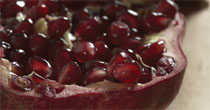Pomegranate - An Ancient Fruit Has Come of Age ©2010
by Joe Smulevitz

The news is out! One of the oldest known fruits, pomegranates have become one of the newest health-giving “super foods” in North America. However, this is old news for people living in Asia and Middle Eastern countries. They valued the medicinal properties of the pomegranate long before modern science knew about its health-promoting benefits.
The history of the ruby-red pomegranate may go back to the dawn of civilization. According to some scholars on ancient history, it may have been a pomegranate and not an apple that tempted Eve in the Garden of Eden. The theory is based on ancient texts. There are numerous references to pomegranates during biblical times. King Solomon, for example, possessed an orchard of pomegranates, and the pillars of the first temple in Jerusalem were decorated with bronze pomegranates. King Tut and other ancient Egyptians were buried with pomegranates in hopes of a second life.
Today scientific research confirms why the ancients held pomegranates in high esteem. Pomegranates, especially the juice, have gained great acclaim as a rich source of powerful plant chemicals called polyphenols. These protective compounds provide plants with their colour and flavour. Inside the pomegranate, the seeds and surrounding pulp called arils, are loaded with polyphenols that are pressed out to make juice. The polyphenols, anthocyanidins (as in berries), and tannins (as in red wine), provide pomegranates with a high level of antioxidant activity that helps protect our cells from damage and may reduce inflammation in the body. Although, many plant-based foods are excellent sources of polyphenols, pomegranates have a higher level than most. They are also a good source of vitamin C, potassium, and fibre, and are low in calories.
In the past decade, numerous studies have been published showing the powerful health potential of pomegranate juice and fruit. More and more research into the “super food” should uncover additional health benefits. Below are highlights of a growing body of recent studies from various health journals, many of which have been duplicated in other studies.
- American Journal of Cardiology: Patients with coronary heart disease who consumed an 8-ounce glass of pomegranate juice daily for 3 months have improved blood flow to the heart.
- University of Naples in Italy: Supplementation with pomegranate juice can help prevent cholesterol plaques from forming on artery walls—a major contributor to heart attacks and strokes.
- Journal Cancer Prevention Research: Pomegranates contain natural compounds that may prevent the growth of hormone-dependent breast cancer.
- Queen Margaret University, Edinburgh: Pomegranate juice helps to lower systolic blood pressure.
- Journal of Urology: A daily glass of pomegranate juice may slow the progression of prostate cancer.
- Journal of Nutrition: Pomegranate fruit extracts can block enzymes that contribute to osteoarthritis.
- International Journal of Impotence Research: Pomegranate juice helpful in the treatment of erectile dysfunction.
- Journal of Herbal Pharmacotherapy: Mouth rinse containing pomegranate reduces bacterial counts in oral plaque.
- Clinical Cancer Research: Pomegranate juice helps to maintain stable PSA levels in men with prostate cancer.
- Arteriosclerosis: Consumption of pomegranate juice may help diabetic patients by lowering oxidative stress that will often lead to vascular disease.
Pomegranate juice, like grapefruit juice, may interact with some prescription drugs. Check with your healthcare provider or pharmacist if you are taking any medication prior to adding pomegranate juice to your diet.
Joe Smulevitz is a nutritional researcher and author of numerous health articles. He can be reached at herbalistjoe@sympatico.ca. |
